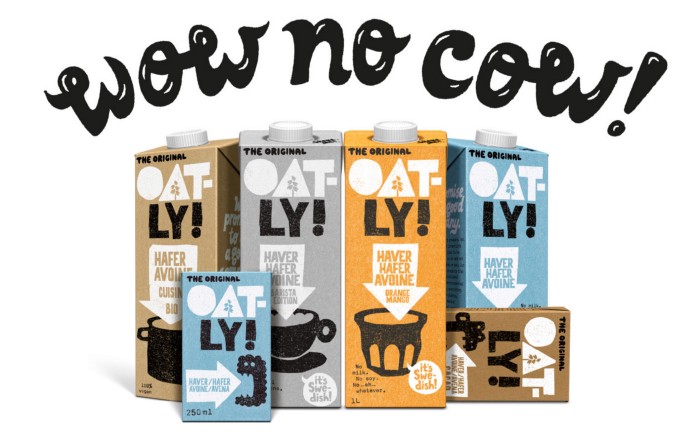
As oat milk sales surge, the fastest-growing plant-based milk brand, Oatly has announced its intention to go public. So, let’s take a look at this very popular vegan company before it lists later this week.
What is Oatly?
Oatly is a Swedish vegan milk maker, producing a sustainable alternative to dairy products using oats. It was formed in the 1990s following research from Lund University, which led it to patent its enzyme technology that turns oats into a milk substitute.
When is the IPO?
Oatly’s IPO is expected to take place on Thursday, May 20th. The Swedish company is offering about 84 million American depositary shares (ADS) at an expected price of $15 to $17. Each ADS represents one ordinary share. The company plans to trade on the Nasdaq under the ticker OTLY.
The company Oatly announced on Tuesday 23 February that it had submitted a confidential filing for an IPO with the US Securities and Exchange Commission. The offering is expected to take place following the SEC’s review, depending on market conditions.
Oatly’s IPO will raise money to fund growth, as well as an opportunity for existing investors to cash in on some of their holdings.
How much is it worth?
Oatly is currently predicted to be valued as high as $10 billion in its US listing. Largely because the IPO is expected to be extremely popular thanks to the IPO boom and the growing interest in sustainable – specifically plant-based – stocks.
Oatly’s IPO has been likened to that of vegan food tech Beyond Meat – the world’s first public vegan meat alternative. If Oatly’s IPO is anything like Beyond Meat, it could be an exciting day when the company does list. Beyond Meat (BYND) shares were initially priced at $25 but quickly began trading at $46 a share, before ending its first trading day at over $65.
Oatly makes money through sales of its oat milk but the brand does also make plant-based ice cream, custard, cold coffee, and yogurt. Its signature milk is widely used as a household alternative, while its ‘barista’ oat milk is used in cafés to create milk for cappuccinos and macchiatos.
The company has also made money through nine funding rounds. Aside from its controversial backer Blackstone, Oatly has received funding from Oprah Winfrey, Jay-Z’s Roc Nation company, Hollywood’s Natalie Portman, and the Belgian investment group Verlinvest.
What’s the Strategy?
Oatly’s strategy is based on the growing demand for plant-based equivalents to dairy. The movement away from dairy is largely fueled by environmental concerns — especially around gas emissions from cattle — and research that dairy-free food is healthier. Demand for its products has been so great, that in early March 2021, the company announced it would be opening one of the world’s biggest plant-based dairy factories in the UK as early as 2023.
Since its founding, Oatly has especially been popular among younger generations thanks to its conscious sustainability-based mission. But in 2020, it faced considerable backlash over its decision to receive $200 million in funding from investment group Blackstone.
Consumers criticized the private equity group’s sustainability credentials and its chief executive Stephen Schwarzman’s history of supporting Donald Trump. In 2019, the Blackstone Group financed companies that contributed to deforestation in the Amazon – not something Oatly consumers thought aligned with the brand’s ethos.
At the time, a spokesperson for Oatly said they were hoping “their investment in Oatly will set an example and create a ripple effect in the financial community. We have the opportunity to show how companies built around sustainability are not only commercially viable but also strategic investments for the future.”
Who’s the Competition?
Oatly’s main competitors are companies such as Danone – which produces the plant-based Alpro brand – organic food delivery firm Abel & Cole, and popular yogurt company Chobani, which continues to develop its own oat-based product line. In fact, Chobani has also reportedly been considering going public, with a rumored valuation between $7 and $10 billion.
Should I invest in OTLY?
While not yet profitable, the growth story for Oatly is certainly robust. Investing in any growth stock with no earnings that is just going public is very likely to be volatile and risky. If you have the stomach for that type of potential downside risk there may also be a real possibility of a nice return on your investment. For those of us that have less of an appetite for risk and also want the benefits of diversification within the rapidly evolving Vegan investing space, one should consider a broader approach to alleviate some of that risk. At Demand Wealth, we have developed the ‘Demand Cruelty Free’ portfolio for this very purpose. It contains cruelty free screened and globally diversified companies that align with your values, risk profile, and financial needs.
Finding cruelty free investments can often be a difficult task! However, at Demand Wealth, it’s one of our specialties. Click here to open an account or learn more by scheduling a zoom with one of our cruelty-free advisors today!
This report is a publication of Demand Wealth. Information presented is believed to be factual and up-to-date, but we do not guarantee its accuracy and it should not be regarded as a complete analysis of the subjects discussed. All expressions of opinion reflect the judgment of the author as of the date of publication and are subject to change.
